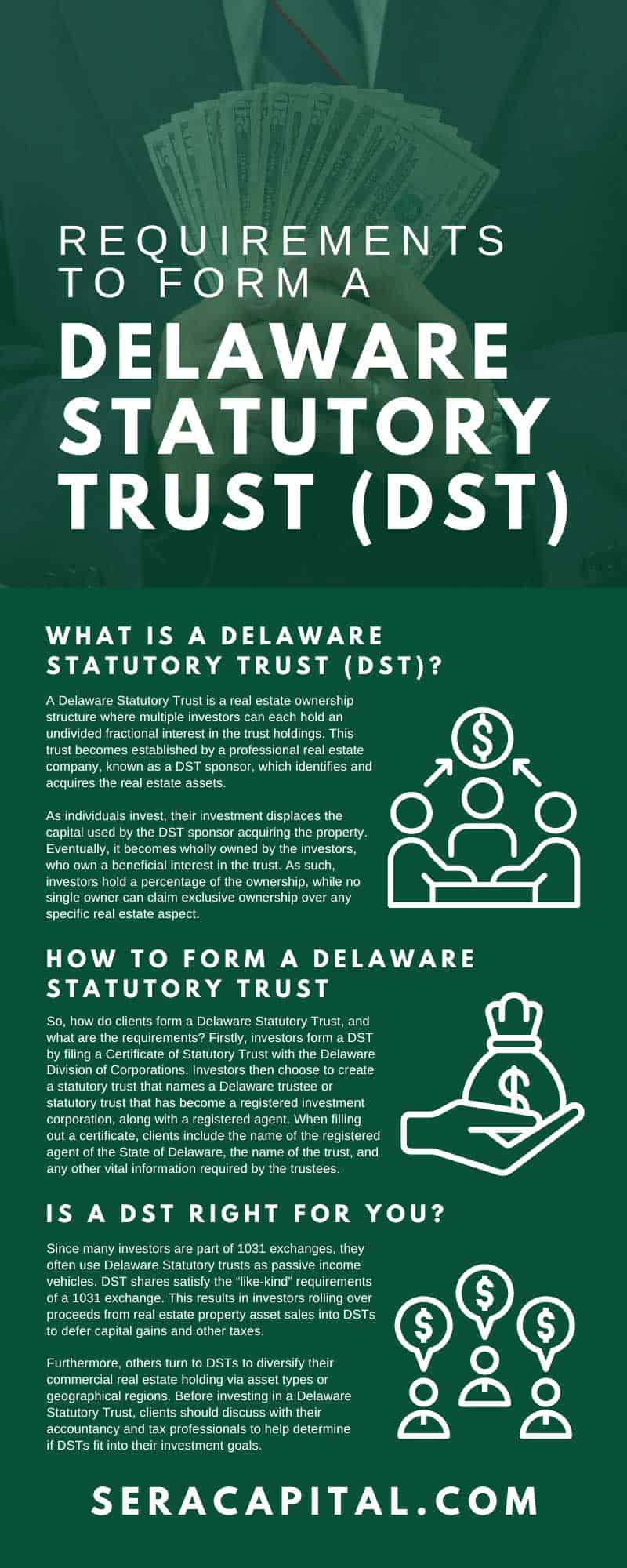Requirements To Form a Delaware Statutory Trust (DST)

Carl E. Sera, CMT
March 20, 2023
Since the early 1900s, Delaware has been a preferred jurisdiction for business entities. Delaware is a business-friendly state because of its corporate laws, a long-standing tradition of legal expertise in corporate affairs, and the judicial system. The state offers business solutions for individual investors through Delaware Statutory Trusts (DST), which have requirements to form efficiently and effectively.
What Is a Delaware Statutory Trust (DST)?
A Delaware Statutory Trust is a real estate ownership structure where multiple investors can each hold an undivided fractional interest in the trust holdings. This trust becomes established by a professional real estate company, known as a DST sponsor, which identifies and acquires the real estate assets.
As individuals invest, their investment displaces the capital used by the DST sponsor acquiring the property. Eventually, it becomes wholly owned by the investors, who own a beneficial interest in the trust. As such, investors hold a percentage of the ownership, while no single owner can claim exclusive ownership over any specific real estate aspect.
How To Form a Delaware Statutory Trust
So, how do clients form a Delaware Statutory Trust, and what are the requirements? Firstly, investors form a DST by filing a Certificate of Statutory Trust with the Delaware Division of Corporations. Investors then choose to create a statutory trust that names a Delaware trustee or statutory trust that has become a registered investment corporation, along with a registered agent. When filling out a certificate, clients include the name of the registered agent of the State of Delaware, the name of the trust, and any other vital information required by the trustees.
While the Delaware Statutory Trust Act of 2002 states that trusts must have a Delaware resident trustee, all other business decisions come from the trust sponsor regardless of their state of residence. Furthermore, the state requests that clients include a cover letter with their name, address, and phone number to expedite any additional communication between the client and the division.
Benefits of a Delaware Statutory Trust
Many benefits come with a Delaware Statutory Trust, including contractual flexibility and tax-saving perks, to name a few. The financed asset-holding entity controls all structured finance transactions, whether clients plan on arranging asset-backed financing, establishing a titling trust, or an equipment leasing transaction.
Easy To Form and Maintain
A DST forms when filing a certificate of trust with the Office of the Secretary of State of the State of Delaware. It only states the name of the trust, along with the name and address of the Delaware trustee. The identity of the beneficial owners of the trust or provisions of the trust agreements aren’t necessary and aren’t publicly disclosed, protecting the privacy of the transaction parties.
However, the DST Act requires the trust to have a Delaware trustee, while business management and trust decisions become delegated to out-of-state co-trustees and managers. Furthermore, the State of Delaware never imposes any annual fees or filing requirements on DSTS—only a low one-time filing fee for the formation of the trust occurs due to the state upon filing the certificate of trust.
Contractual Flexibility
The DST Act express policy gives maximum effect to the principle of freedom of contract and the enforceability of trust agreements. The policy of freedom of contract means parties can agree with themselves concerning matters, including management and economic rights of owners, duties, and the rights of managers, mergers, indemnification, and other mixed entity reorganizations.
Furthermore, the policy of freedom of contract includes other management and operational issues. Fiduciary duties to the beneficial owners or the statutory trust and related liabilities become expanded, restricted, or eliminated in the trust agreement and additionally, provided only that the trust agreement must not eliminate the implied contractual covenant of fair dealing and good faith.
Limited Liability
A DST offers protection to its managers, trustees, and beneficial owners. Beneficial owners of a Delaware Statutory Trust become have entitlement to the same liability protections that Delaware law provides to Delaware corporation stockholders under the DST Act. As such, trustees located in or outside of Delaware and other managers of the DST aren’t personally liable to third parties for acts, obligations, or omissions of the DST.
Flexible Tax Treatments
A Delaware Statutory Trust is purposely structured as a corporation, a trust for federal and Delaware income tax purposes, or a partnership. A DST can qualify as a financial asset securitization investment trust (FASIT), a real estate mortgage conduit (REMIC), a registered investment company (RIC), or a real estate investment trust (REIT).
Tax Savings for Estate Beneficiaries
A significant benefit to a Delaware Statutory Trust is that they offer estate planning benefits. Beneficiaries can defer capital gains, depreciation recapture, and net investment income tax upon the death of an owner through a step-up basis. Furthermore, the estate can divide a DST investment among beneficiaries seamlessly, which typically is a challenging situation for traditional, directly owned, fee-simple real estate assets.
A CPA can discount a DST investment after calculating the total estate value as an illiquid investment with partial ownership. It’s common to see discounts ranging from 20 to 30 percent, serving to reduce potential estate taxes.
Sophisticated Dispute Resolution
Another benefit to Delaware Statutory Trusts is their sophisticated dispute resolution capabilities. The Delaware Court of Chancery has jurisdiction over fiduciary and trust matters. It’s generally regarded as the preeminent business count of the U.S. Moreover, the Delaware Court of Chancery offers parties of sophisticated business transactions the opportunity to arbitrate or mediate their disputes as long as their trust agreement contains specific required language.
Greater Income Potential
While DST properties emphasize cash flow, acquiring high-quality institutional properties in cities with strong projected growth allows DSTs to focus on preserving investment value. Furthermore, it also comes with more significant income potential for investors.
The monthly income from DSTs varies from trust to trust, depending on the investment thesis and the property type. However, independent investors can generate more monthly income through the ownership of a DST property than typical direct property ownership.
Is a DST Right for You?
Since many investors are part of 1031 exchanges, they often use Delaware Statutory trusts as passive income vehicles. DST shares satisfy the “like-kind” requirements of a 1031 exchange. This results in investors rolling over proceeds from real estate property asset sales into DSTs to defer capital gains and other taxes.
Furthermore, others turn to DSTs to diversify their commercial real estate holding via asset types or geographical regions. Before investing in a Delaware Statutory Trust, clients should discuss with their accountancy and tax professionals to help determine if DSTs fit into their investment goals.
Sera Capital focuses on helping clients with their money and providing education, advice, and management. Our registered financial advisors offer clients our wisdom and experience to help implement, manage, monitor, review, and adjust portfolios in every financial situation. If you want to speak with our representatives, schedule a free 20-minute phone call today.

Categories
Strategize Your Success
